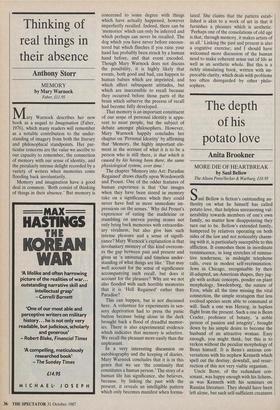Thinking of real things in their absence
Anthony Storr
MEMORY
by Mary Warnock Faber, £11.95
Mary Warnock describes her new book as a sequel to Imagination (Faber, 1976), which many readers will remember as a notable contribution to the under- standing of imagery from both the literary and philosophical standpoints. Her par- ticular concerns are the value we ascribe to our capacity to remember, the connection of memory with our sense of identity, and the peculiarly intense delight recorded by a variety of writers when memories come flooding back involuntarily.
Memory and imagination have a good deal in common. 'Both consist of thinking of things in their absence.' But memory is concerned to some degree with things which have actually happened, however imperfectly recalled. Indeed, there can be 'memories' which can only be inferred and which perhaps can never be recalled. The dog which you have never before encoun- tered but which flinches if you raise your hand has probably been struck by a human hand before, and that event encoded. Though Mary Warnock does not discuss the possibility, it is highly likely that events, both good and bad, can happen to human babies which are imprinted, and which affect subsequent attitudes, but which are inaccessible to recall because they occurred before those parts of the brain which subserve the process of recall had become fully developed.
That memory is an important constituent of our sense of personal identity is appa- rent to most people, but the subject of debate amongst philosophers. However, Mary Warnock happily concludes her chapter on 'Personal Identity' by affirming that 'Memory, the highly important ele- ment in the account of what it is to be a person who is still there, is that which is caused by his having been there, the same physiological system, over time.'
The chapter 'Memory into Art: Paradise Regained' draws chiefly upon Wordsworth and Proust. One of the odder features of human experience is that 'Our images when they have been stored in memory take on a significance which they could never have had as more immediate im- pressions on the senses.' Why did Proust's experience of eating the madeleine or stumbling on uneven paving stones not only bring back memories with extraordin- ary vividness, but also give him such intense pleasure and a sense of signifi- cance? Mary Warnock's explanation is that involuntary memory of this kind overcom- es the gap between past and present and gives us 'a universal and timeless under- standing of what things are like.' That may well account for the sense of significance accompanying such recall, but does it account for the pleasure? Why are we not also flooded with such horrible memories that it is 'Hell Regained' rather than Paradise?
This can happen, but is not discussed here. A volunteer for experiments in sen- sory deprivation had to press the panic button because being alone in the dark brought back a flood of dreadful memor- ies. There is also experimental evidence which indicates that memory is selective. We recall the pleasant more easily than the unpleasant.
In a very interesting discussion on autobiography and the keeping of diaries, Mary Warnock concludes that it is in this genre that we see 'the continuity that constitutes a human person.' The story of a human life has significance, she believes, because, by linking the past with the present, it reveals an intelligible pattern which only becomes manifest when formu-
lated. She claims that the pattern estab- lished is akin to a work of art in that it furnishes a pleasure which is aesthetic. 'Perhaps one of the consolations of old age is that, through memory, it makes artists of us all.' Linking the past and present is also a cognitive exercise; and I should have welcomed more discussion of the human need to make coherent sense out of life as well as an aesthetic whole. But this is a richly stimulating book, written with im- peccable clarity, which deals with problems too often disregarded by other philo- sophers.


































































 Previous page
Previous page